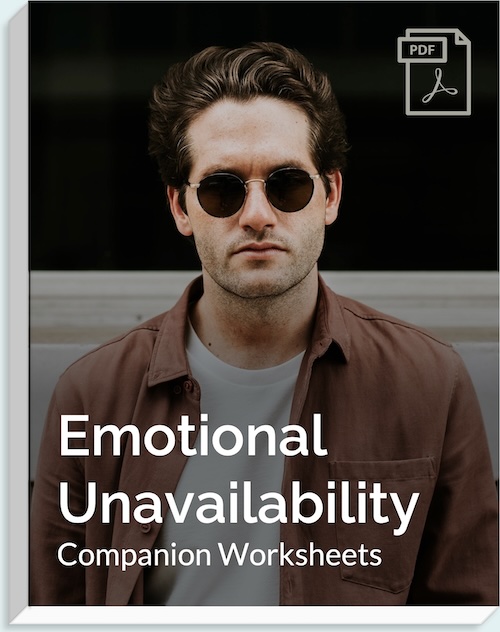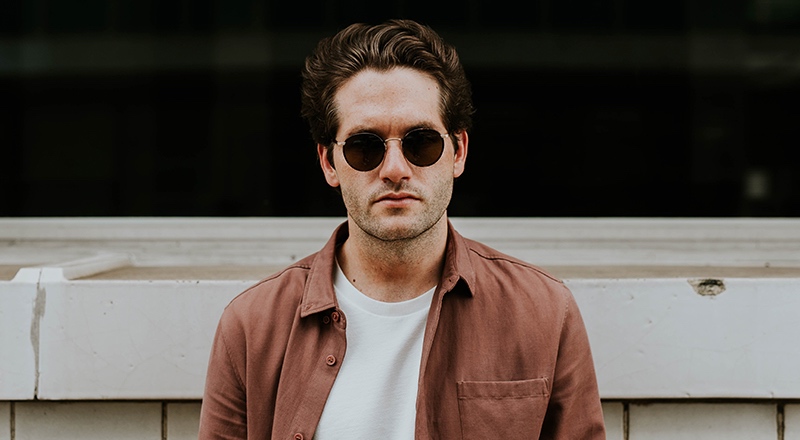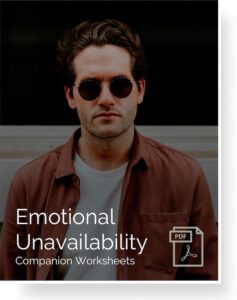What Does it Mean to Be Emotionally Unavailable?
Wondering what does it mean to be emotionally unavailable?
Have you ever had a relationship with someone where you felt like you were always guessing – like you never really knew where you stood with them?
Or maybe you know someone who avoids conflict by diving into details, or someone who insists on doing everything on their own, even when they’re clearly overwhelmed.
On the surface, these behaviours seem different. But underneath? They often come from the same root: emotional unavailability.
It’s a term that gets thrown around a lot. But in my experience – and in my work with clients – most people don’t fully understand what it means or how subtly it can show up in relationships.
That’s why I created this 3-part series. If you’ve ever questioned someone’s capacity to show up emotionally – or wondered if you’re just being “too sensitive” – this series will help you make sense of what’s really going on.
- What does it mean to be emotionally unavailable? (Part 1)
- How to tell if someone is emotionally unavailable. (Part 2)
- How to deal with emotionally unavailable relationships. (Part 3)
Plus you can use the free companion worksheets to help you even further in understanding and dealing with this destructive and hurtful relationship pattern.
Emotionally unavailable = (someone who is) unavailable emotionally
Even if you’ve never thought about it, you have some idea about what it is just based on the words: Emotionally Unavailable. Pretty straightforward right?
Emotionally unavailable:
- Means no emotions available for connection
- Refers to those who create barriers and/or obstacle between themselves and others to try and avoid emotional pain
- Typically shows up in someone who causes (or participates in) drama
People who are available for emotional connection, are connected to themselves and their ‘personal truth’. When that type of personal connection exists, the tendency or willingness to participate in needless drama is greatly reduced.
People who make themselves available for emotional connection can:
- Draw boundaries
- Ask for what they need
- And say ‘no’ comfortably
Therefore, there is no need for drama!
Emotional intimacy can be scary…
It requires that you allow yourself to be “seen”; I’ve heard it explained best as “Intimacy is Into-Me-See”.
Once you open up to being seen for your truth (who you really are) you risk being rejected – and quite simply rejection sucks! Most of us prefer to avoid rejection, and we do all kinds of crazy sh*t to meet that end.
Unless a person has a strong sense-of-self, they’ll avoid sharing themselves authentically. Instead they’ll put up a ‘front’ that seems more socially acceptable (try to fit the mold of what society identifies as normal and “good”) and make themselves be that instead.
You know what I mean… they’ll be:
- Really nice
- Independent
- Super accommodating
- Over the top chivalrous
- Kind of aloof (mysterious)
- Really needy (damsel-in-distress or poor-me)
…And the list goes on.
Regardless, none of these are strategies for long-term success, peace of mind, and life satisfaction – I can promise you that!
Why does emotional unavailability develop in the first place?
People wouldn’t choose this for themselves, it just doesn’t make sense. Especially for human-beings that are actually wired for connection. We are relationship driven creatures so having relationships is what we naturally want to do.
Unfortunately along the way, we’ve lost the art of how to do relationships well. Instead we cover the desire for that up with all that crazy stuff we were just talking about. That, coupled with all kinds of other emotional baggage, makes being emotionally unavailable a go-to coping strategy.
Here are a some more detailed explanations of why emotional unavailability develops:
Low Self-Worth:
The emotionally unavailable person believes (consciously or unconsciously) that if you were to see who they really are, you wouldn’t like them. I’ve often noticed that the people who suffer from this don’t even know that’s what the problem is; they’re unconscious to this belief.
The more we see other people’s lives through the highlight reels on social media, rather than experience real interactions with people, the worse this problem will get.
Emotional Inequality:
The emotionally unavailable person has experienced their feelings and needs not mattering as much as the other person. (Again most of the time people who suffer from this are oblivious to it; oblivious to the idea that they set their feelings as a second priority to others.)
Emotionally Abandoned:
They’ve been burned so many times, repeatedly let down and disappointed by the important people in their lives: friends, lovers, and family alike. Emotional unavailability develops as a coping mechanism or a way to survive in the world we currently live in.

If you have a strong sense of your worth, you won’t put up with emotionally unavailable people.
A common theme I notice is that, at this point, people start to see how the other people in their lives are emotionally unavailable. But rarely does it jump out at you how you fit into this problem.
It often doesn’t occur to you that if you’re chronically involved with emotionally unavailable people, you might be emotionally unavailable too! It’s just that your version of unavailability looks different.
I know. A tough one to wrap your head around…and it’s the truth.
Let’s say you tend to attract people who are a little aloof, cool, or independent – they may even play hard to get?
You have the thought: “If you could just get them to open up and fully trust me, we could have a great relationship!”
Familiar?
I know.
So then let me guess – you go about using every trick in the book to try and create a ‘safe space’ for them to open up in…
And just like that, guess what – you’re proving my assertion.
If you had a strong sense of yourself and your worth, you wouldn’t put up with people who intentionally withhold themselves.
You wouldn’t have time for it. It simply wouldn’t be a game you’d play.
The emotionally unavailable person would just go from the friend/lover category, back to the acquaintance category without so much as a second thought.
That kind of tendency, the creating a ‘safe space’ for them to open up in, allows you to put all the focus on them and what they need instead of having to stop and look at yourself.
You get to live in the illusion that it’s THEM that’s causing a lack of intimacy in the relationship, not you.
Telling yourself ‘it’s not me, it’s them’ allows you to avoid:
- Looking at yourself
- Doing the work of figuring out why you’re afraid of intimacy
- And deciding what do you need to do about it
Emotionally available people don’t play games – intentionally or otherwise.
At this point the question that comes up is:
“I can see what you’re talking about, but what do I do about it?”
This is a deep topic, which is why I’ve broken it into three separate conversations. Smaller chunks make it easier to understand and actually apply.
The purpose of this first conversation is to open you up to the idea that you may be carrying some fear of intimacy or emotional unavailability yourself. And to show you how that fear blocks you from creating happy, mutual, and nourishing relationships.
Here’s the thing: emotional unavailability doesn’t just show up in your dating life. It seeps into friendships, family patterns, even the way you treat yourself when things get hard. That’s why awareness is the first step – you can’t change what you can’t see.
Your homework (if you want to take it on): For the next few days, notice the little moments where you pull back emotionally. Don’t judge them, just write them down.
- Did you downplay something that bothered you because you didn’t want to “make it a big deal”?
- Did you avoid bringing up a need or request because it felt uncomfortable?
- Did you feel safer keeping the conversation light when you really wanted to go deeper?
Just keep a running list – even one-word notes in your phone count. By the time you come back for the next post, you’ll already have real-life examples that will make the next step a lot clearer.
In the next post, I’ll help you identify emotional unavailability for sure. By the end of this series you’ll be able to:
- See how and where emotional unavailability shows up in your life
- Understand the impact it has on your relationships
- Know what to do about it and how to break the cycle
I’ve also created free worksheets (see below) for each post to help you deepen your understanding and ability to transform this heartbreaking pattern.
Spot Emotional Unavailability Early – Before It Wastes More of Your Time
Your shortcut to spotting emotional unavailability and breaking the pattern.
These worksheets will help you:
- Identify the subtle signs of emotional unavailability early
- Understand why you’ve been drawn into these patterns
- Get clear on what to stop tolerating – so you can choose differently
“This blog and worksheets helped me finally understand why I kept attracting emotionally unavailable partners. For the first time, I could see the pattern – and start making different choices.“
Jessica – Reader









